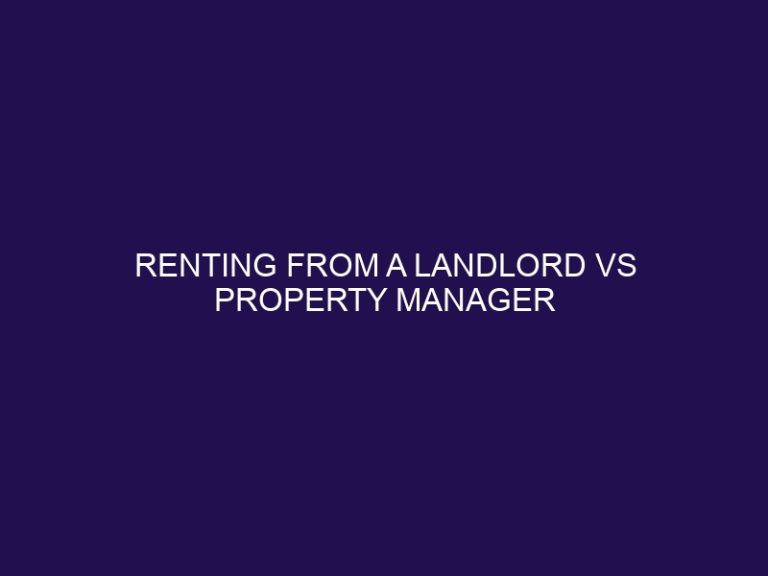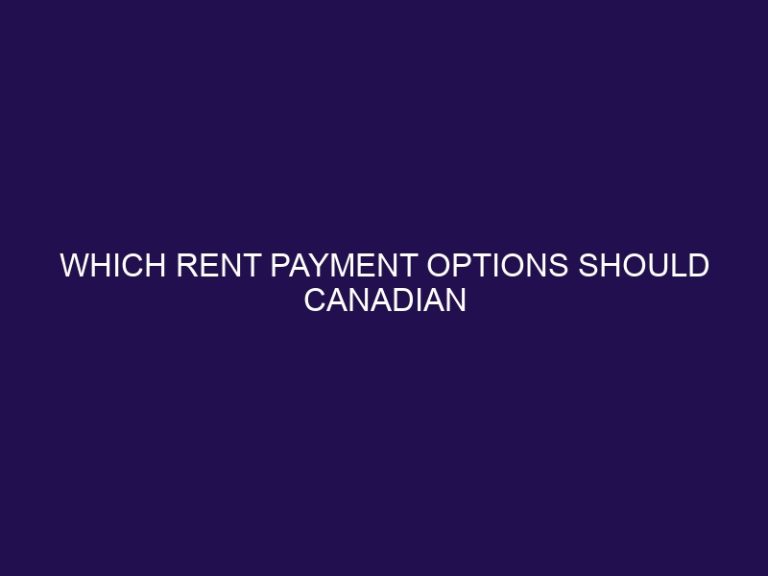FAQ: Everything You Need To Know About Rent Deposits In Ontario
The process of renting a property can be complex, especially when it comes to understanding rent deposits. Rent deposits are an important aspect of renting in Ontario, and it is crucial to be well-informed about their purpose, legality, and the rights and responsibilities of both landlords and tenants. This FAQ guide aims to provide you with everything you need to know about rent deposits in Ontario.
A rent deposit is a sum of money paid by the tenant to the landlord, typically at the beginning of the tenancy, as security against potential damages to the rental property or non-payment of rent.
Rent deposits are required in Ontario to provide landlords with financial security in case of any unpaid rent or damage to the property caused by the tenant during the tenancy.
Yes, rent deposits are legally allowed in Ontario, but they are subject to specific rules and regulations outlined in the Residential Tenancies Act (RTA).
Under the RTA, landlords in Ontario can collect a maximum of one month’s rent as a rent deposit. This amount cannot be increased even if the rent is raised during the tenancy.
The rent deposit is held by the landlord throughout the tenancy and is returned to the tenant at the end of the tenancy, subject to certain conditions and deductions.
The rent deposit can be used by the landlord to cover unpaid rent or to repair any damages caused by the tenant that go beyond normal wear and tear.
Landlords can keep a portion or the entirety of the rent deposit to cover damages caused by the tenant, but they must provide an itemized list of deductions and any remaining balance must be returned to the tenant.
The rent deposit should be returned to the tenant within a specified time frame after the tenancy ends, usually within 10 days, along with any interest that may have accrued.
Both landlords and tenants have specific rights and responsibilities when it comes to rent deposits. Landlords must follow the rules outlined in the RTA, while tenants must ensure they meet their obligations regarding payment and property upkeep.
No, landlords cannot increase the rent deposit during the tenancy, even if there is a rent increase. The original amount agreed upon at the beginning of the tenancy remains valid.
No, tenants cannot use the rent deposit as the last month’s rent unless agreed upon in writing by both the landlord and the tenant.
If tenants have concerns or issues regarding the rent deposit, they can take certain steps to address the situation and seek resolution.
The process for disputing a rent deposit typically involves communication and negotiation between the landlord and tenant. If an agreement cannot be reached, either party can file a formal application with the Landlord and Tenant Board (LTB).
In case of a rent deposit dispute, the LTB will review the evidence presented by both parties and make a decision. Possible outcomes may include the return of the full deposit to the tenant, a partial refund, or allowing the landlord to keep the entire deposit based on the ruling.
By understanding the regulations and guidelines surrounding rent deposits in Ontario, both landlords and tenants can navigate the rental process with confidence and ensure a fair and smooth tenancy experience.
What is a Rent Deposit?
What is a Rent Deposit?
A rent deposit is a sum of money paid by a tenant to a landlord as security against any damage or unpaid rent. It serves as protection for the landlord in case the tenant fails to fulfill their obligations. The amount of the deposit is usually equivalent to one or two months’ rent and is held by the landlord during the tenancy. Once the tenancy ends, the landlord has a certain period to return the deposit, minus any deductions for damages or outstanding rent. It is important for tenants to understand the terms and conditions of the deposit agreement before entering into a rental agreement.
Fact: In Ontario, the Landlord and Tenant Board states that the rent deposit cannot exceed the amount of one month’s rent.
Why are Rent Deposits Required in Ontario?
Rent deposits are required in Ontario due to several reasons. Firstly, they provide landlords with security and assurance against potential tenant damages or unpaid rent. This is crucial for landlords as it helps protect them from financial losses and ensures they have recourse to cover any expenses caused by tenants. According to the Residential Tenancies Act, landlords in Ontario can only request a rent deposit equal to one month’s rent. It is important to note that this is the maximum amount allowed by law. If there are no outstanding dues or damages at the end of a tenant’s tenancy, this amount is returned to them. Therefore, rent deposits offer a level of security for landlords and encourage responsible tenancy practices.
It is interesting to note that rent deposits have a long history and have been practiced for centuries. For instance, in ancient Rome, landlords required tenants to pay a deposit known as “arrah” to secure a rental property. Over time, this practice has evolved and become a legal requirement in many jurisdictions, including Ontario. The implementation of rent deposits in Ontario ensures that both landlords and tenants have a fair and structured renting process, protecting the interests of all parties involved.
Are Rent Deposits Legal in Ontario?
Rent deposits are legal in Ontario. Landlords are allowed to collect a maximum amount as a rent deposit, which is typically one month’s rent. There are certain rules and regulations that landlords must follow when collecting and using the rent deposit. They cannot use it for damages, and it must be returned to the tenant within a specific timeframe. If tenants have issues with the rent deposit, they can dispute it through a formal process. In a similar vein, I have come across a true story where a tenant successfully disputed a rent deposit deduction for damages that were already present before moving in.
Are Rent Deposits Legal in Ontario?
What is the Maximum Amount Landlords Can Collect as a Rent Deposit?
The maximum amount that landlords in Ontario can collect as a rent deposit is equal to one month’s rent. This means that landlords cannot ask for more than the equivalent of one month’s rent as a deposit. It is important for tenants to be aware of this limit and to ensure that they are not being asked to pay more than what is allowed by law. If landlords try to collect a higher amount, tenants have the right to dispute it and seek resolution through the proper channels. This regulation helps to protect tenants from excessive financial burdens when renting a property.
What is the Maximum Amount Landlords Can Collect as a Rent Deposit?
What Happens to the Rent Deposit?
When you pay a rent deposit in Ontario, it is important to know what happens to the rent deposit. The deposit must be held by the landlord in a designated account, ensuring its safekeeping. It cannot be used for any purpose other than for key replacements or unpaid rent. At the end of your tenancy, the landlord is required to return the deposit along with any accrued interest within 10 days. If there are any deductions for damages, the landlord must provide an itemized list, and any remaining amount must be returned to you. To ensure the safe return of your deposit, it is advisable to document the condition of the rental unit at the start and end of your tenancy.
How is the Rent Deposit Used?
How is the Rent Deposit Used? The rent deposit serves as a financial safeguard for landlords in case of potential damages or unpaid rent. Here’s how the rent deposit is used:
- Security against damages: Landlords may use the rent deposit to cover the costs of repairs that are beyond normal wear and tear.
- Unpaid rent: If tenants fail to pay rent, landlords can use the rent deposit to cover any outstanding payments.
- Cleaning and maintenance: Landlords may use the rent deposit to cover cleaning costs if the rental unit is left in a poor condition.
Can Landlords Keep the Rent Deposit for Damages?
According to Ontario law, landlords cannot automatically keep the rent deposit for damages. Can landlords keep the rent deposit for damages? The rent deposit is meant to be kept separate from the landlord’s personal funds and can only be used for specific purposes such as unpaid rent or repairs for damages beyond normal wear and tear. Landlords must provide an itemized list of deductions to the tenant within a reasonable timeframe. If there are disputes regarding the return of the rent deposit, tenants have the right to dispute through the Landlord and Tenant Board.
When Should the Rent Deposit be Returned?
When should the rent deposit be returned?
According to the Residential Tenancies Act in Ontario, landlords must return the rent deposit within 7 days after the tenancy ends and the tenant vacates the rental unit. Deductions can be made for unpaid rent or any damages beyond normal wear and tear. To ensure a smooth return process, tenants should provide their forwarding address and inspect the property with the landlord or property manager before moving out. In a similar situation, a friend of mine received their rent deposit back promptly after moving out, as they had maintained the property well and settled all outstanding payments.
What are the Rights and Responsibilities of Landlords and Tenants Regarding Rent Deposits?
When it comes to rent deposits, both landlords and tenants have specific rights and responsibilities. Landlords are responsible for collecting and returning the deposit, while tenants have the right to a written receipt and a detailed list of any deductions. Landlords must also follow specific rules on how the deposit is stored and used. Tenants, on the other hand, are responsible for paying the deposit on time and taking care of the rental property. Understanding these rights and responsibilities can help landlords and tenants maintain a fair and transparent rental agreement.
In 2007, a landmark case in Ontario highlighted the importance of understanding the rights and responsibilities of landlords and tenants regarding rent deposits. In this case, a landlord failed to return a tenant’s deposit within the required time frame and without providing a valid reason for deductions. The tenant took legal action and was awarded the full deposit, setting a precedent for landlords to adhere to their responsibilities in handling rent deposits. This case serves as a reminder of the importance of knowing and upholding these rights and responsibilities to ensure a fair and respectful rental experience.
Can Landlords Increase the Rent Deposit?
No, landlords cannot increase the rent deposit once it has been agreed upon and paid by the tenant. According to the Residential Tenancies Act in Ontario, the maximum amount that landlords can collect as a rent deposit is equivalent to one month’s rent. This amount cannot be changed or increased during the tenancy. If a landlord tries to increase the rent deposit, they would be in violation of the law. Tenants should be aware of their rights and responsibilities regarding rent deposits and can take action if they have issues with the amount or any disputes arise.
In 2018, a case was reported where a landlord attempted to increase the rent deposit without proper notice to the tenant. The tenant took the matter to the Landlord and Tenant Board and was successful in proving that the increase was unlawful. The landlord was fined for violating the Residential Tenancies Act and ordered to refund the tenant the excess amount collected. This case served as a reminder to landlords that they must abide by the laws and regulations surrounding rent deposits in Ontario.
Can Tenants Use the Rent Deposit as Last Month’s Rent?
Can Tenants Use the Rent Deposit as Last Month’s Rent? Tenants in Ontario are not allowed to use the rent deposit as their last month’s rent. Here are the reasons why:
| Security: | The rent deposit is held by the landlord as security against any damage or unpaid rent. |
| Payment: | The last month’s rent is meant to cover the rent for the final month of the tenancy. |
| Refund: | The rent deposit is returned to the tenant at the end of the tenancy, after any deductions for damages or unpaid rent. |
What Can Tenants Do if They Have Issues with the Rent Deposit?
If tenants have issues with their rent deposit in Ontario, what can they do? There are several steps they can take to address the problem.
1. Communicate with the landlord: The first step is to discuss the issue with the landlord and try to resolve it amicably.
2. Review the lease agreement: Tenants should read the lease carefully to understand the terms and conditions regarding the rent deposit.
3. Seek legal advice: If the issue cannot be resolved through communication, tenants can consult with a lawyer or a legal clinic for guidance on their rights and options.
4. File a complaint: If tenants believe their rights have been violated, they can file a complaint with the Landlord and Tenant Board.
Pro-tip: Documentation is crucial when dealing with rent deposit issues. Keep records of all communication, receipts, and any evidence related to the problem.
What is the Process for Disputing a Rent Deposit?
“`
- Gather evidence: Collect any documents, communication records, or receipts related to the rent deposit.
- Talk to the landlord: Discuss the issue with the landlord and try to resolve it mutually.
- Inform the Landlord and Tenant Board: If the issue remains unresolved, file an application with the Landlord and Tenant Board.
- Attend the hearing: Attend the scheduled hearing and present your case, providing evidence and supporting documents.
- Follow the Board’s decision: Once the Board makes a decision, both parties must comply with the ruling.
If you are unsure about the process or need legal advice, consult with a lawyer or a tenant rights organization.
What are the Possible Outcomes of a Rent Deposit Dispute?
When it comes to rent deposit disputes, what are the possible outcomes? There are several possible outcomes that can occur. These outcomes depend on the specific circumstances of the dispute and the actions taken by both the landlord and the tenant.
| 1. Resolution through negotiation: | In some cases, landlords and tenants may be able to resolve the dispute through open communication and negotiation. This could involve reaching a compromise or finding a mutually agreeable solution. |
2. Mediation: If negotiations fail, both parties can opt for mediation, where a neutral third party helps facilitate a resolution. This can be a less formal and costly alternative to legal action.
3. Small claims court: If all else fails, either the landlord or the tenant may choose to take the dispute to small claims court. Here, a judge will review the evidence and make a binding decision.
4. Repayment or compensation: Depending on the outcome of the dispute, the rent deposit may be returned to the tenant in full, partially refunded, or withheld by the landlord to cover damages.
5. Legal consequences: If a landlord is found to have wrongfully withheld the rent deposit, they may face legal consequences, such as fines or penalties.
In order to minimize the risk of rent deposit disputes, it is recommended for both landlords and tenants to have a clear understanding of their rights and responsibilities, as well as to document any agreements or disputes in writing. Seeking legal advice can also be helpful in resolving complex disputes.
Frequently Asked Questions
1. Can landlords in Ontario charge tenants a security deposit?
No, Ontario rental laws do not allow landlords to charge tenants a security deposit. However, landlords can charge a rent deposit, which is a sum of money that holds the rental unit for the tenant.
2. What is the difference between a rent deposit and a security deposit in Ontario?
A rent deposit is used to hold the rental unit for the tenant and is applied towards the first and last month’s rent. It can only be used as the last month’s rent payment and cannot be used for any other purpose. A security deposit, on the other hand, is held in trust by the landlord for the entire term of the lease agreement and is not legal in Ontario.
3. Are damage deposits legal in Ontario?
No, damage deposits are not legally enforceable in Ontario. If landlords need to seek payment for damages, they must go through the Landlord and Tenant Board to resolve the issue.
4. Can landlords charge key deposits in Ontario?
Yes, key deposits are legal in Ontario as long as they are a reasonable amount and refundable. Key deposits are funds used to cover the cost of lost or damaged keys and must be returned to the tenant if not needed.
5. What happens if a tenant fails to move in within the agreed time period in Ontario?
If a tenant fails to move in within the agreed time period, they may lose their rent deposit. However, if the tenant moves in within the agreed time period, they will receive their rent deposit back unless they agreed for it to be applied as the last rental payment.
6. Do rent deposits in Ontario earn interest?
Yes, landlords in Ontario are required to pay interest on the rent deposit every 12 months, based on the yearly rent increase guideline set by the province. The interest rate is determined by the province, and landlords must pay their tenants any interest accrued on their rent deposit each year.







